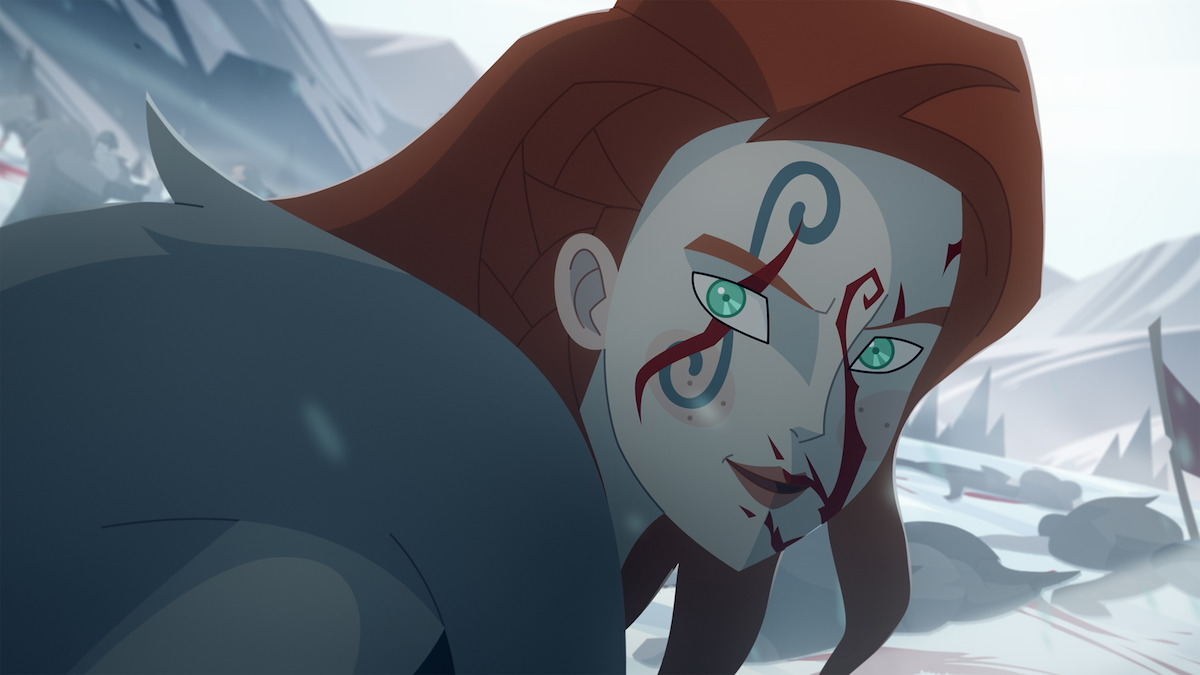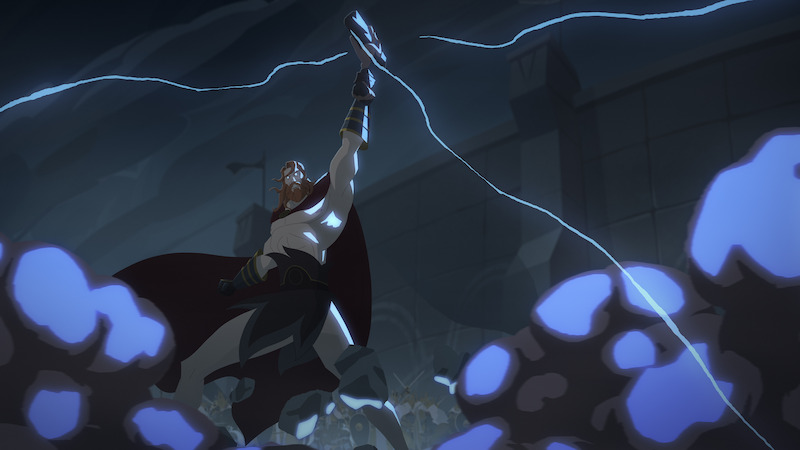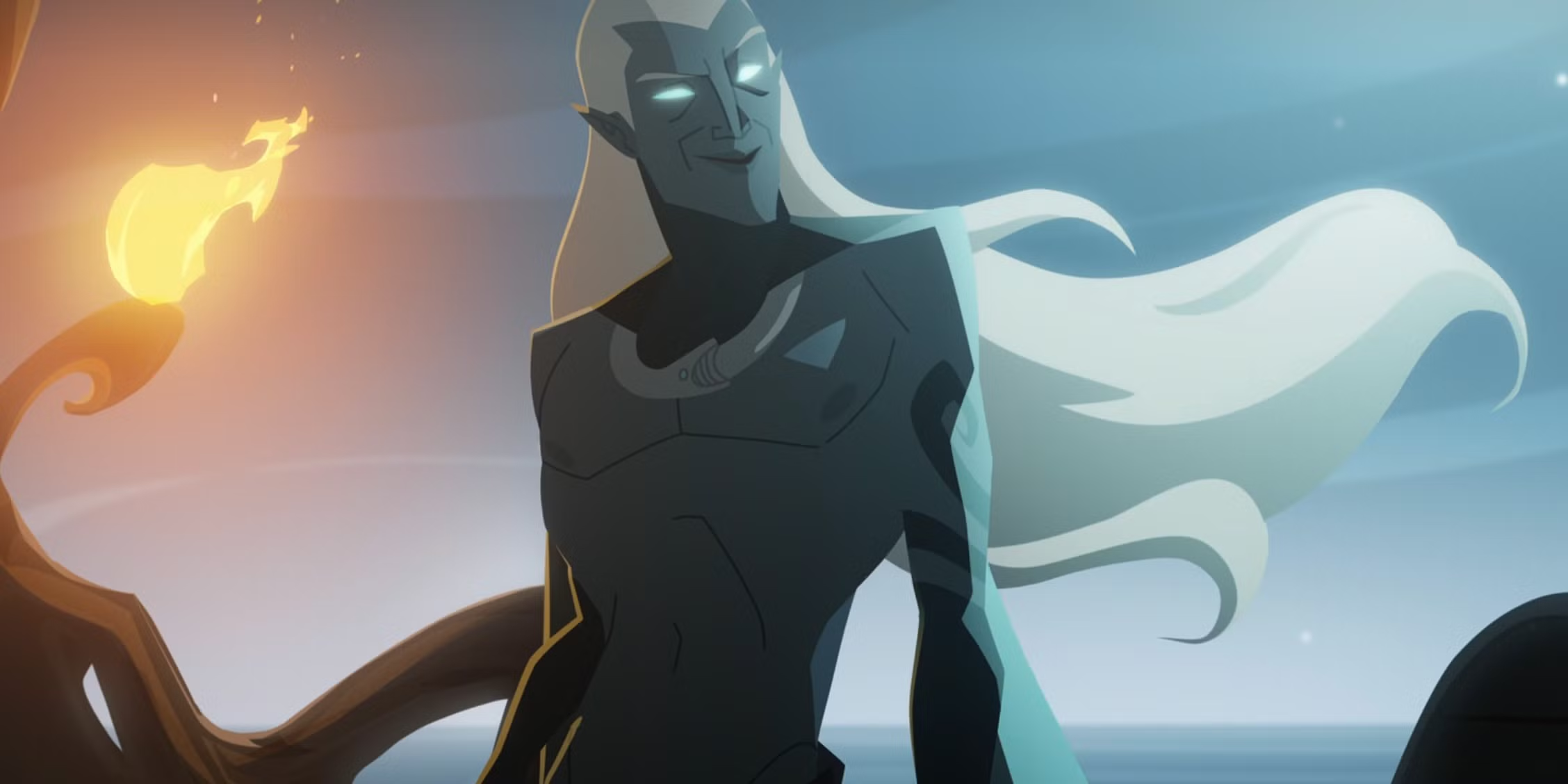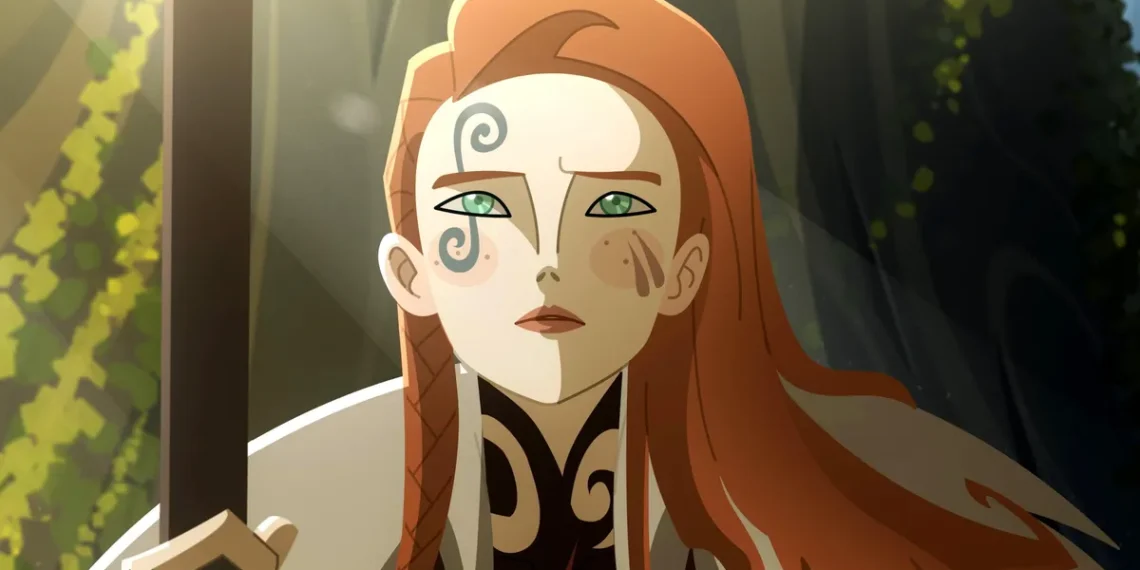Zack Snyder’s animated series Twilight of the Gods offers a gripping and condensed narrative across just eight episodes, culminating in a dramatic and intense season finale. The series mixes Norse mythology with original characters, presenting a unique interpretation of familiar gods and events. Central to the plot is Sigrid, the protagonist, whose quest for revenge stems from a horrific act of violence by Thor Odinson. On her wedding day, Thor massacres the giants of the Open Hand, leaving only Sigrid and her fiancé Leif alive. This massacre serves as the catalyst for Sigrid’s bloodthirsty journey to avenge her people.
Sigrid’s quest for vengeance is complicated further when she’s pulled into the underworld by Loki, the God of Mischief. Her sole objective is to kill Thor for the brutal deaths of her family, including her children. Alongside her, an unlikely band of allies is formed, consisting of gods, giants, and humans. The battles that unfold are filled with bloodshed, shifting alliances, and surprising revelations. Ultimately, the season’s conclusion is filled with unexpected deaths and plot twists, making it a compelling watch.
Twilight of the Gods Ending Explained
One of the most incredible moments in the series finale is Loki’s unexpected betrayal, where he kills Sigrid. The twist is both brutal and surprising, as Loki stabs Sigrid, leading to her painful death. Sigrid, a half-giant, had already been in a precarious position, battling some of the most powerful gods. Yet, Loki’s role in her demise is the most unsettling part of the finale. Throughout the series, Sigrid remained wary of Loki, but she relied on him to aid in her mission to kill Thor.

At first, it seemed Loki might not pose a significant threat to Sigrid. Despite their uneasy alliance, Loki’s betrayal comes at a moment of desperation. After Thor is temporarily pulled off the battlefield by Freya, leaving Sigrid without the chance to kill him, Loki decides to intervene. He kills Sigrid, telling her that her death will lead her to Valhalla, where she will face Thor again. Loki explains that this is her chance for one final encounter with her target, framing it as an opportunity rather than an end. This act of betrayal may seem cruel, but it makes sense from Loki’s perspective, as gods see mortal lives as inconsequential.
Key Deaths in Twilight of the Gods’ Finale
Sigrid’s death is not the only incredible loss in the Twilight of the Gods finale. The battle is filled with tragic deaths, many of which shape the story’s conclusion. For instance, Freya removes Thor from the battlefield following the death of his brother Baldr, a god known for his compassion and integrity. Baldr had earlier shielded Thor from the truth about Sigrid and Leif’s survival, trying to protect them by claiming they were dead. Baldr’s death is deeply sorrowful, particularly as it is an unintentional consequence of Sigrid’s actions. She accidentally kills him while attempting to strike Thor with her spear, which leads to his tragic demise.
Another major death is that of Tiwaz, a new character created for the show. The tree-like god’s death is one of the most brutal, as Thor decapitates him and then smashes his head with his hammer after Tiwaz’s body attempts to reattach itself. Thor’s violent destruction of Tiwaz serves as a stark reminder of the power and wrath Thor embodies. Alongside these major characters, many of Sigrid’s companions also meet their end. Hervor, a mother yearning to join her sons in Valhalla, dies in battle but is tragically denied entry into the afterlife. Instead, she is taken to Hel, the kingdom of the dead, where she finds no peace. Other characters like Seid-Kona also perish, but Seid-Kona’s death is unique in that she is reborn as a goddess, adding a layer of complexity to the show’s depiction of life and death.
The Reunion of Sigrid and Thor
Despite the tragic death of Sigrid, her journey isn’t entirely over. Following her death, Loki’s plan to send her to Valhalla comes to fruition. In the afterlife, Sigrid awakens in a golden hall, surrounded by warriors celebrating. Thor soon appears behind her, signaling that their long-running feud is far from finished. The reunion between Sigrid and Thor is intense, as she immediately sets her eyes on him, still determined to fulfill her mission of vengeance. However, the show ends on a cliffhanger, leaving the outcome of their encounter unresolved. Sigrid’s fiery scowl and relentless desire for revenge are clear, setting the stage for what could be an explosive continuation of their conflict.

Loki’s True Motive: Causing Ragnarök
True to his nature as the God of Mischief, Loki’s machinations drive much of the series’ events, with his ultimate goal being the initiation of Ragnarök, the prophesied end of the gods. Loki’s desire for vengeance against Thor is rooted in personal losses: Thor had imprisoned Loki’s children—Hel, Fenrir, and Jörmungandr. While Loki’s plan for Ragnarök is still unfolding, it is clear that he wants to bring about the death of the gods, even if it means his own destruction. This plot point mirrors themes in Norse mythology, where Loki’s actions contribute to the demise of many gods during Ragnarök.
The idea of Ragnarök, or the death of the gods, has been explored in various mythological retellings, including in Marvel’s Thor: Ragnarok. However, Twilight of the Gods takes a different approach, painting a more complex and darker picture of the event. While the battle has caused significant loss of life, Ragnarök has not yet come to pass in this version of the story. The true end of the gods remains unresolved, setting up potential future storylines. As Thor is still alive and many gods have perished without fulfilling the prophecy, the question of whether Ragnarök will happen is left in suspense.
Why Hervor is Denied Valhalla
The death of Hervor is particularly poignant in the series finale. Throughout Twilight of the Gods, Hervor mourned the loss of her sons, who had died in battle and were sent to Valhalla. Hervor herself yearns to join them in the afterlife. However, her tragic fate takes an unexpected turn. Despite her noble death in battle, Hervor is denied entrance to Valhalla. This is because she had used cursed weapons, which, according to the Valkyrie, disqualified her from entering the hallowed halls of Valhalla. Instead, she is taken to Hel, the underworld.
In Hel, Hervor meets Hel, the goddess of the underworld, who tries to console her by explaining that peace in Hel is greater than the glory of Valhalla. However, this explanation offers little comfort to Hervor, who had hoped for a reunion with her sons. This moment highlights the series’ darker interpretation of the afterlife and the moral complexities surrounding death and honor. Hervor’s fate serves as a tragic reminder of the unpredictable and often unjust nature of life and death in this world.

Potential for a Second Season of Twilight of the Gods
Twilight of the Gods has left fans eager for more, and while a second season hasn’t been confirmed, the show’s potential for continuation is clear. The finale opens several doors for future storylines, particularly concerning Thor’s fate and the unfolding of Ragnarök. The show’s Rotten Tomatoes score suggests that it has been well-received, which may increase the chances of a renewal. Many key plot points remain unresolved, especially the ongoing conflict between Sigrid and Thor. The uncertainty of Thor’s future and the looming possibility of Ragnarök present ample material for a second season.
The series ends on a cliffhanger, leaving major plotlines like Sigrid’s quest for revenge and Loki’s plans for Ragnarök hanging in the balance. Whether or not the show returns for a second season, Twilight of the Gods has already proven itself to be a thrilling and action-packed series, packed with compelling characters, intense battles, and plenty of emotional stakes. Fans are eagerly waiting to see whether the story will continue and how the ultimate fate of the gods will unfold.





